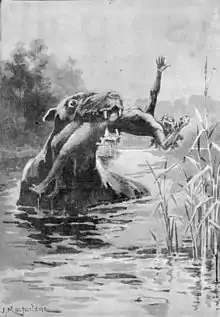bunyip
English

A fanciful depiction of a bunyip (1890)
Etymology
From Wathaurong ban-yib.
Pronunciation
- IPA(key): /ˈbʌnjɪp/
Audio (AU) (file)
Noun
bunyip (plural bunyips)
- (Australia) A mythical Australian monster, said to inhabit swamps and lagoons.
- 2007, Janet Parker, Julie Stanton (editors), Mythology: Myths, Legends and Fantasies, page 387,
- The bunyip here was considered to have a magical power over humans, causing them considerable misfortune. Places where there were many eels tended to be where bunyips lived, as this was their food. On one occasion, Aboriginal people claimed that a bunyip lured a woman to her death by distracting her with a large catch of eels. It was considered extremely bad luck to kill or injure a bunyip.
- 2008, Oliver Ho, Mysteries Unwrapped: Mutants & Monsters, page 26:
- According to the stories, the Bunyip comes in many different shapes and sizes—some are covered in feathers, while others have scales like a crocodile. Most Aboriginal drawings show the Bunyip with a tail like a horse, and flippers and tusks like a walrus.
- 2007, Janet Parker, Julie Stanton (editors), Mythology: Myths, Legends and Fantasies, page 387,
- (Australia, slang, obsolete) An imposter or con-man.
Derived terms
See also
References
- Dixon, R. M. W., Bruce Moore, W. S. Ramson, Mandy Thomas (2006) Australian Aboriginal Words in English: Their Origin and Meaning, 2nd ed. edition, Oxford University Press, →ISBN, pages 104–106
- Seal, Graham (1999) The Lingo: Listening to Australian English, University of New South Wales Press, →ISBN, page 15
This article is issued from Wiktionary. The text is licensed under Creative Commons - Attribution - Sharealike. Additional terms may apply for the media files.